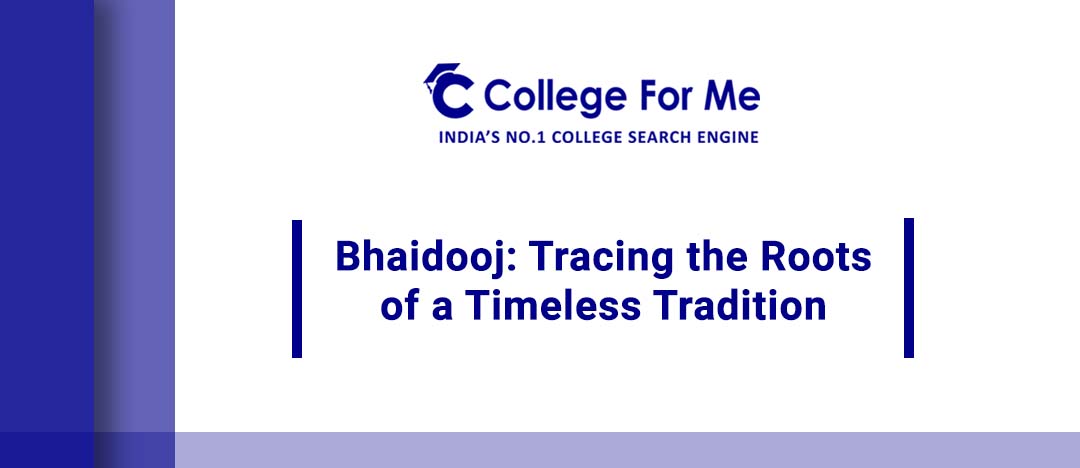Career Scopes Of A B.Tech. Student
There is a high demand for B.Tech. degree holders in the private sector, yet, there is also the opti...

India celebrates Bhaidooj, also called Bhai Phota in Bengal and Bhau Beej in Maharashtra, with great enthusiasm. Siblings have a particular place in their hearts during the celebration, which takes place on the fifth day of Diwali. However, have you ever given any thought to the fascinating history and development of this beloved custom? Let's go through time to discover the fascinating past of Bhaidooj.
Historical Origins:
Bhaidooj has Hindu mythological roots dating back thousands of years. A well-known myth connected to the celebration is about lord Krishna and his sister Subhadra. The story goes that Lord Krishna went to see his sister Subhadra after
Bhaidooj: Tracing the Roots of a Timeless Tradition
India celebrates Bhaidooj, also called Bhai Phota in Bengal and Bhau Beej in Maharashtra, with great enthusiasm. Siblings have a particular place in their hearts during the celebration, which takes place on the fifth day of Diwali. However, have you ever given any thought to the fascinating history and development of this beloved custom? Let's go through time to discover the fascinating past of Bhaidooj.
Historical Origins:
Bhaidooj has Hindu mythological roots dating back thousands of years. A well-known myth connected to the celebration is about lord Krishna and his sister Subhadra. The story goes that Lord Krishna went to see his sister Subhadra after defeating the demon king Narakasura, and she greeted him with flowers and sweets. She adorned Krishna's forehead with tilak as a sign of her love and care. It is thought that the Bhaidooj tradition, in which sisters tilak their brothers' foreheads, was inspired by this endearing deed.
Festival Evolution:
Bhaidooj has changed over the ages, adjusting to the various eras and cultural influences. There have been minor changes in the way that people celebrate the event, but the fundamental idea of honouring the relationship between siblings has not changed.
Bhaidooj used to be a very straightforward celebration that included the tilak ceremony, sweets exchanged, and sincere prayers for each other's well-being. Nevertheless, the festival has adopted new styles in the contemporary period. Now, brothers organise surprise parties and outings to make the day unforgettable, while sisters anxiously await creative gift ideas. The emergence of social media has also changed the way siblings show their affection for one another; sincere greetings and virtual get-togethers are now commonplace, particularly for those who live apart.
Significance and Cultural Impact:
Bhaidooj is a celebration of the enduring relationship between siblings, not only a festival. It highlights the value of family and strengthens the bonds that unite brothers and sisters on an emotional level. The celebration also supports gender equality by emphasising the equal value of brothers and sisters within the family unit.
Outside of India, Bhaidooj has become more well-known in recent years. Indian communities around the globe unite to celebrate this festival as a means of preserving and transmitting their cultural legacy to the next generation.
To sum up, the historical foundations of Bhaidooj and its historical development demonstrate the strength of tradition against modernity. In addition to honouring the customs, let's also appreciate the centuries-old heritage that has moulded the relationship between brothers and sisters, making Bhaidooj a genuinely timeless and touching occasion.
defeating the demon king Narakasura, and she greeted him with flowers and sweets. She adorned Krishna's forehead with tilak as a sign of her love and care. It is thought that the Bhaidooj tradition, in which sisters tilak their brothers' foreheads, was inspired by this endearing deed.
Festival Evolution:
Bhaidooj has changed over the ages, adjusting to the various eras and cultural influences. There have been minor changes in the way that people celebrate the event, but the fundamental idea of honouring the relationship between siblings has not changed.
Bhaidooj used to be a very straightforward celebration that included the tilak ceremony, sweets exchanged, and sincere prayers for each other's well-being. Nevertheless, the festival has adopted new styles in the contemporary period. Now, brothers organise surprise parties and outings to make the day unforgettable, while sisters anxiously await creative gift ideas. The emergence of social media has also changed the way siblings show their affection for one another; sincere greetings and virtual get-togethers are now commonplace, particularly for those who live apart.
Significance and Cultural Impact:
Bhaidooj is a celebration of the enduring relationship between siblings, not only a festival. It highlights the value of family and strengthens the bonds that unite brothers and sisters on an emotional level. The celebration also supports gender equality by emphasising the equal value of brothers and sisters within the family unit.
Outside of India, Bhaidooj has become more well-known in recent years. Indian communities around the globe unite to celebrate this festival as a means of preserving and transmitting their cultural legacy to the next generation.
To sum up, the historical foundations of Bhaidooj and its historical development demonstrate the strength of tradition against modernity. In addition to honouring the customs, let's also appreciate the centuries-old heritage that has moulded the relationship between brothers and sisters, making Bhaidooj a genuinely timeless and touching occasion.

There is a high demand for B.Tech. degree holders in the private sector, yet, there is also the opti...

If you are looking for a bright and prospective career, then getting a B.Tech. in CSE must be under ...
Comments (0)